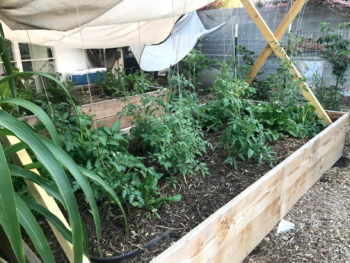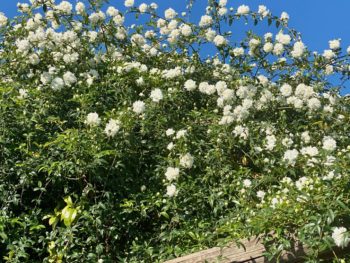Dear Gardening in The Desert Friends:
We wanted to create an easy guide to help you through these uncertain times. Food security is at the forefront of our thoughts right now, as is building our immune systems. This post shares simple ideas of what to grow right now, what herbal support you should be considering and other things you could be doing to support your immune system and stay healthy.
We encourage you as a community to stay connected through social media, phone calls, and video chats, but we also want to stress the importance of social distancing and self-quarantine at this time.
Gardening For Food Security
Currently, many of us are still harvesting produce from our winter gardens. We encourage you to find ways to use or preserve everything you can. Most herbs are very abundant at the moment and not only add flavor to food, but they are also filled with health benefits. Learn to dehydrate, freeze, ferment and pickle extra produce. Citrus is particularly abundant, it can be juiced and frozen and is a welcomed source of Vitamin C.
Plant crops that either grow quickly or are very prolific. It is a good idea to buy some larger seedlings if yours are still quite small. No one is panic shopping seedlings but this will supply you with food much sooner. Do not waste any garden space. If you are growing something that gets tall, like tomatoes, grow arugula or lettuce below. Grow a 3 sisters garden. Plant melons or squash when planting out okra and eggplant. The taller plants will provide some sun protection to the vining plants. It will also be important to practice succession sowing for continual harvests. If you have grow lights, use them for flats of cut add come again lettuce, herbs or microgreens. Additionally, learn which weeds in your garden are edible such as mallow, dandelion, prickly lettuce and more.
Here is a list of vegetables to plant right away.
- Lettuce seedlings.
- Spinach seedlings.
- Arugula. Toss out arugula seeds between other veggies.
- Eggplant. Very prolific.
- Squash. Especially zucchini and spaghetti squash. Zucchini squash is very quick producing and spaghetti squash won’t be long after. Others like butternut are also great but take longer to mature and will be good for food security in the coming months if needed.
- Melons and watermelon. Especially early ripening varieties.
- Cucumbers and Armenian cucumber.
- Tomatoes. Normally very productive. However, get larger seedlings if you have not planted out tomatoes yet.
- Beans. Plant as much as you can. Cowpeas and long beans are prolific. Pole type varieties take up much less space than bush varieties, however, some bush varieties produce much faster.
- Okra. This will not be producing for a while but are extremely prolific. For a family, plant 6-8 plants.
- Corn. Try quick maturing varieties.
- Sweet potato. Grow now for the greens.
- Peppers. These should be starting to flower right now. Consider adding snacking peppers.
- Basil. Very productive with numerous health benefits. Do not forget the holy basil which is especially beneficial as an adaptogen in stressful times.
- Green Onions.
- Swiss Chard.
- Microgreens.
- Sunflowers. The heads are edible and varieties that produce multiple heads will provide a good source of food.

HERBAL SUPPORT
While there has not been enough testing evidencing the effect of the herbs listed below on Covid-19 in particular, understanding how the virus works and how viruses attach to cells and understanding the herbal actions on viruses and immune support make these good options to consider. The herbs listed below will work to either increase the body’s ability to protect itself or to support the microbiome.
RECOMMENDED READING
We recommend reading the articles below from John Slattery, a bioregional herbalist, and Paul Bergner of the North America Institute of Herbal Medicine. The articles are long but very informative on how the virus attaches to our cells and what preventative measures we can take.
HERBS FOR PROTECTION AND SUPPORT
Immune tonic herbs, mostly listed below, will help to fortify the body against viral infection. Some of the herbs listed provide a calming effect on the digestive system, helping the microbiome to function better, therefore supporting better health and immunity.
- Astragalus: Helps to build and restore health to the body and is best taken long term. Astragulus is particularly protective of the lungs and helps to dispel mucus build up. It is a soothing and protective herb and is useful as a long term everyday herbal immune support and also at the onset and during a viral infection. Purchase from StarWest Botanicals or Mountain Rose Herbs either in powdered or slice form. It can be added to soups, smoothies or teas. Use in large amounts.
- Meadowsweet: While meadowsweet has no viral actions, it works to calm and support the digestive system. It builds up the stomach acid and strengthens the microbiome. Having a healthy microbiome is vital to a strong immune system.
- Garlic: Garlic is an overall immune supporter and often used for an upper respiratory infection. It will help to relieve congestion in the lungs. Garlic releases a compound called allicin when crushed or chopped. Allicin is anti-oxidant and has anti-inflammatory properties. Use in very large quantities to increase immunity. Garlic is especially effective when eaten raw, so try adding to dressings, make sauces like chimmichurri, include in hummus, or even just eat a clove raw daily.
- Reishi Mushroom: Has antiviral properties and powerful anti-inflammatory properties. In addition, reishi will strengthen the lungs. It is an immune modulator that strengthens and grounds the body. Take care not to consume raw mushrooms. Look for a dual extracted product, meaning the medicinal properties have been extracted in both water and alcohol. The water extracts the beta-glucans and the alcohol extracts the triterpenes. Watch Yarrow Willards Video.
- Chaparral/Creosote: We have an abundance of creosote in our desert. Bio-regional herbalist John Slattery recommends using creosote as a steam inhalation to keep the respiratory system healthy. It should be used as a preventative and also a treatment option at the onset of a respiratory infection. Those living in areas where there is no creosote, feel free to use oregano, thyme, sage or bee balm in the same way. In California, sagebrush or white sage can be used, however, be careful about over-harvesting white sage.
- Cinnamon: Cinnamon is drying and warming. It gets the phlegm moving. This is a virus that has a lot of damp in the lungs. Chinese researchers are exploring the benefits of cinnamon to help move the dampness. Add to food or teas in liberal amounts. Ensure that you are using true cinnamon and not cassia.
- Ginger: Ginger is going to fortify your body. It is warming, anti-inflammatory and will help to prevent the virus from sticking to the cells. Use generously by adding to foods, drinking teas and even making a fermented ginger bug.
- Hibiscus & Rose Hips: Boosting daily Vitamin C is very beneficial to support the immune system. Both hibiscus and rose hips are very high in Vitamin C. They can be used in teas and other beverages or even infused into honey. Eating freshly picked citrus is also a good boost of vitamin C.
- Turkey Tail Mushroom: This mushroom works to modulate the immune system’s response to a virus. It protects both the liver and the lungs and increases low energy. Turkey Tail removes toxicity from the body, especially the liver. If the body is already toxic, the immune system will be very compromised.
- Turmeric: An overall immune support and anti-inflammatory. Turmeric is popular in golden milk, but can also be added to everyday foods. For best absorption, it should be combined with a bit of fat and some black pepper.
- Brittlebush: Used as a tea for a tight painful cough.
ANTI-VIRAL HERBS and Foods
Herbs to use at the onset and during the treatment of a virus
- Elderberry/ Elder Leaf: Prevents viruses from attaching to the cells. Additionally, if you are already affected by a virus, it prevents the virus from replicating in the body and shortens the duration of the viral infection. It is almost impossible to find elderberry right now as it is the most used herbal ally for viruses that affect the respiratory system.
Do not use elderberry if you are predisposed to an auto-immune condition, as it can overstimulate the immune system. Elderberry should not be taken all the time. However, it is used as an everyday tonic during cold and flu season for its many benefits. John Slattery is also recommending decoted elderberry leaf. This can be used as a preventative right now by consuming a small amount each day. To make, simmer 4oz of elderberry leaf in ½ gallon of water until there is only 32oz of liquid remaining. Preserve by adding 8oz of alcohol, he uses Everclear but an 80% vodka will be fine. Take at a dose of 30 drops 3x a day for prevention and immune support. If an infection has been contracted, use 1-2 oz. - Yarrow: Is antiviral but also used as a diaphoretic, meaning it causes sweating to expel toxins and bring down fevers. Consume as a tincture. Start to grow your own yarrow. Once established, it will easily self sow and come back every year. Not only does it have a lot of healing properties, but it is also an excellent companion plant improving the health of other plants and also attracting beneficial insects. Plant the white yarrow for medicinal purposes.
- Osha Root: Has long been used to support respiratory infections, including the flu. It helps to clear mucus, therefore relieving congestion of the lungs and sinuses and it increases blood circulation to the lungs. It is also anti-viral.
- Oregon Grape Root: The effective compound in Oregon Grape Root is berberine, a powerful alkaloid. Oregon Grape root should not be used long term but is effective for short-term immune support and to ward off /slow down infection. Oregon grape root is also very anti-bacterial and will kill off good gut bacteria. Therefore it is important to consume fermented foods to replenish the healthy gut biome.
- Coconut Oil: Coconut oil is an immune system powerhouse. It contains lauric acid and caprylic acid, which strengthen the immune system. Coconut oil is easy to add to foods, smoothies, or rub on skin (especially those cracked hands from washing so often). The Phillipines is currently studying the use of coconut oil as a treatment for Covid-19.
ADDITIONAL HERB CONSIDERATIONS
In addition to the herbs listed below, adaptogenic herbs are also very beneficial in times of stress and for everyday support of the body. They do not offer any anti-viral properties but work with hormones and other bodily functions to support us. Some of these include ashwagandha, holy basil, maca root, licorice root, and American ginseng. Other herbs to consider for calming properties and sleep are lemon balm, passionflower, hops, kava-kava, and skullcap.
SIMPLE TIPS FOR STAYING HEALTHY
It’s important to maintain whole body integrity during this time. There are a few self-care things you can do to maintain good health and a strong immune system.
- Yoga: Doing some gentle yoga every day will elevate the good feel hormones, provide some gentle stretching and improve health overall. There are many youtube videos to get started. We highly recommend yoga with Adrienne. She has a wide range of videos at different skill levels and to help with different issues.
- Meditation: Clearing the mind from clutter helps us stay calm, think more clearly and improves our creativity and focus. Daily meditation also improves overall health. Again YouTube, has many videos for guided meditation. Headspace and Breethe are great phone apps.
- Spend Time Outdoors: Spend time in nature and the sunshine. Garden, take walks, hike or spend time in the forest. Remember to keep your social distance while out. Nature is a natural anti-depressant and helps bring us back in balance. This time of year, the wildflowers are starting to put on a show, take the time to appreciate all that nature has to offer us. Work on your foraging skills as well.
- Gut Biome: In order to have a healthy gut biome, we need to consume prebiotic foods. Eat food high in both soluble and insoluble fiber including fresh fruit and veggies, oats, and whole grains. We also need food rich in probiotics, such as fermented foods, which are perfect for increasing the beneficial gut bacteria and enzymes. Consume lacto-ferments such as kimchi, sauerkraut, fermented veggies, and pickles. Also, ginger bugs, kombucha, kefir, rejuvelac, tepache, and sima are fermented drinks that have health benefits. Bake using a sourdough starter for leavening.
- Vitamin D3 drops: Vitamin D is CRUCIAL to a healthy immune system. During the winter months, the angle of the sun prevents UVB rays from reaching the Earth. UVB is needed in order for the body to make Vitamin D3. It is recommended to supplement with Vitamin D3 drops right now.
- Rest: Getting sufficient sleep is vital for supporting hormones and overall health. It may be difficult to fall asleep if you are concerned about everything happening. Find a routine to help, tune out of social media and the news at least an hour before bedtime, especially from any news or stories that will cause anxiety. Take a warm shower, do an evening yoga flow or meditation. Consider a cup of tea before bedtime. Consider California poppy leaf, hops, passionflower, lemon balm, kava-kava or chamomile . One of my favorites is linden. Also, the sleep stories on youtube for adults are helpful. This is my story of choice.
- Smudging: If you do have to work out of the home at this time or are exposed to others, smudge your home with white sage often. It works to kill off germs in the air. You could also use other dried herbs such as pine, sweetgrass, thyme, rosemary, and lavender.
- Herbal/essential oil steam. Fill a large pot of water and put it on the stove. Fill with herbs such as rosemary or branches of eucalyptus, which both have respiratory benefits and antibacterial and antiviral properties. Breath in the steam as you walk by and let the aroma fill your house.
- Moist sinuses: When sinuses are dry, you quickly become vulnerable to respiratory infections. If you are having an issue, increase your water intake. Adding a mallow root powder, or some dried root to the water will also help to quickly alleviate dryness in the body. Mallow root is also available in capsule form. You could also use a humidifier, but providing moisture from the inside is best.
- Water: Keep up on drinking enough water or other beneficial beverages such as teas, infusions, pure fruit juice, coconut water, and soups. Water is simply one of the essentials for maintaining health.












 How to Grow Peach Trees in the Desert
How to Grow Peach Trees in the Desert